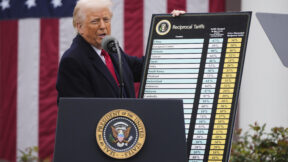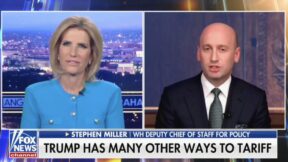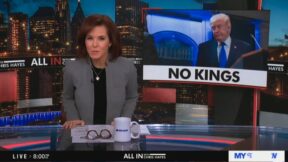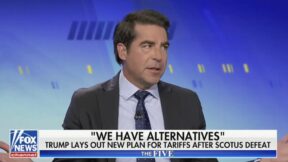José Díaz-Balart Can Corner Obama and Enrage Coulter; What Can He Do for MSNBC?

Good luck getting an opinion about Cuba out of José Díaz-Balart.
The 54-year-old Cuban-American newscaster, 30-year broadcast veteran, and son of anti-Castro exile Rafael Díaz-Balart was only five months into his tenure at MSNBC when news broke of American prisoner Alan Gross’ release from Cuban custody. It was 8:54 a.m., six minutes before that day’s show was set to air.
Díaz-Balart in Miami and his executive producer in New York scrapped the entirety of the two-hour program. The newscaster “went on autopilot,” he said, plying information from Gross’ cousin, who called Alan’s release a “Hanukkah miracle.” Then, about an hour later, word began to leak that Gross’ release was an overture in an historic shift in U.S.-Cuban relations. Díaz-Balart would host six hours of English-language broadcast on the issue over the next three days, talking to foreign correspondents, Cuban dissidents, Republican legislators fiercely opposed to the deal, and still no one could tell what he thought.
This was not true of all the Díaz-Balarts. Over on Fox News, at literally the same moment as Diaz-Balart was interviewing a woman whose brother had been murdered by one of the Cuban Five, Representative Mario Díaz-Balart (R-FL) was denouncing President Barack Obama as the “appeaser-in-chief” for capitulating to the Castros. The contrast couldn’t have been greater: Two brothers, one channel apart, one of them decrying the reopening of Cuba in the fieriest language possible, the other quizzing a bipartisan sequence of guests, “The Way Forward” flapping in a banner beneath him.
I asked Díaz-Balart whether he agreed with his brother. He deflected. I asked him whether his father’s exile from his homeland affected how he processed Obama’s surprise détente. He deflected. He talked about the need to put voices on the air. He talked about Latin America. He talked about impartiality. He did everything but describe what it was like to be the most accomplished Cuban-American broadcaster in the business and to break the news that a stalemate that began before he was born might finally be coming to an end.
“It’s not about me,” he said.
He was speaking from the Miami set of his nightly Spanish-language newscast for Telemundo; I was in one ear in English, his producer in the other in Spanish. He interrupted once to tape an interview in Spanish, returned and spent his final few minutes answering my questions in English, then hung up, swiveled around on his chair, and began his broadcast in Spanish.
Díaz-Balart is arguably the hardest-working man in cable news. His day goes roughly like this: 6 a.m. phone call to his MSNBC team in New York to preview the show, The Rundown. 9-11 a.m., two hours of straight live broadcast on MSNBC. Then over to Telemundo’s studios to prep for Noticiero Telemundo at 6:30. On days like last Wednesday he’s available to the rest of MSNBC as a contributor; that day he appeared on The Reid Report at 2:00, The Cycle at 3:00, and Hardball at 7:00. Somewhere in there he goes to Washington D.C. and tapes a Spanish-language Sunday discussion show called Enfoque, essentially Telemundo’s Meet the Press.
There’s crossover: Guests from Telemundo (an NBC property) show up on The Rundown; guests from The Rundown reappear on Enfoque. Senator Marco Rubio (R-FL), who led a strident opposition to Obama’s normalization of relations with Cuba last week, recorded a Spanish-language interview with Díaz-Balart for Enfoque; he stuck around and did an English language one for MSNBC.
The osmosis of the two worlds is part of the point. “He’s brought a lot different guests, some Hispanic, some from South Florida, who talk on all topics, that I now see being sort of scattered throughout the day,” said MSNBC president Phil Griffin, who emphasized Díaz-Balart’s internal effect on the network as much as his ability to broaden its audience.
Sometimes the languages bleed. On Díaz-Balart’s first day on MSNBC he hosted “Maria,” an undocumented teen who had crossed into the U.S. after her brother was murdered by a Honduran gang, a frontline witness to last summer’s border crisis. Diaz-Balart live-translated his interview with her, first posing each question in English for the MSNBC audience, translating it for Maria, then converting her answers back. It was a work of broadcasting virtuosity that got him noticed, and not entirely in a good way.
“And the Oscar goes to … THE ILLEGAL IMMIGRANT WEEPING ON MSNBC!” tweeted conservative gadfly Ann Coulter. “I wonder if Díaz-Balart’s media career is helped by massive Latin Amer. immigration? Does anyone who supports mass immigration not have a personal financial motive?”
Díaz-Balart’s debut in the midst of the immigration crisis was almost too perfect. No sooner did he make a name for himself with that initial bilingual interview than many media watchers pegged him as a one-trick pony, great so long as immigration was in the Zeitgeist — which, given the bouncing-ball erraticism of cable news, was hardly a guarantee.
This criticism got a rise of the anchor. He quickly listed the stories he’s brought to the fore, from elections in Brazil to missing students in Iguala to the drug cartel-fueled poppy explosion in northern Mexico.
“The people that want to try to define you because of your last name or the languages you speak — there’s always people who have to try to find a way to explain the unexplainable to them,” he told me. “I’ll let that little rat wheel go around on its own.”
David Schoetz, Díaz-Balart’s 30 Rock-based executive producer, was, if anything, more offended at the suggestion. He pointed out that for a one-issue anchor, Díaz-Balart sure seemed in the middle of a lot of the stories du jour, the missing Mexican students and Cuba being prime examples.
“Congress, the policy perspective — he’s been covering that in English and Spanish for twenty-five years!” Schoetz objected. “We cover a tremendous amount of real estate — twenty guests, 6-8 topics per show. He’s going to be exposed if he’s unable to do those topics.”
For all that, Díaz-Balart fully celebrates his role as a conduit between Obama and the immigrant community. He’s interviewed Obama one-on-one ten times, his most recent, two weeks ago, being the first for his new show. Pressing Obama on immigration policy to a Latino audience can yield troublesome soundbites for the president. It was in a January 2013 Telemundo interview that Obama appeared to state that he did not possess the authority to delay deportations — the very authority he used to delay them in an executive order last month.
Díaz-Balart’s interview was trotted out this fall not only by conservative blogs but mainstream news outlets, all of which wondered just how brazenly Obama could loop his legal logic. It got to the point that Meet the Press invited Díaz-Balart to explain the context of the interview, as if he could magically resolve the tension between Obama’s two contradictory positions.
“If you look at the interviews President Obama’s given,” José’s lawmaker brother Mario told me, “the most aggressive questions have been from José and from his counterpart on Univision, Jorge Ramos. They’ve confronted the president on his contradictions of saying one thing and doing something totally different.” (In that same interview Obama laid out conditions Cuba had to satisfy to win any concessions from the U.S.; those conditions, José pointed out, have not been met.)
Díaz-Balart is agnostic on the executive action’s legality. “I’m not a lawyer,” he said. “[Obama] says that he has gone as far as he can go. That’s what all of his legal people tell him, including the Attorney General and Homeland Security Secretary [Jeh] Johnson, that he has gone as wide as he can using his authority. That’s quite a bit — 5.5 million out of 11 or 12 that are undocumented is a big, big group of people. I remind him that for three years he told me he couldn’t do this. So I think he feels that he has gone as far as he can. I’ll take him at his word.”
But interviews with Obama are two-way streets. Díaz-Balart takes the opportunity to report back to the president about the fears of the immigrant community — fears that the executive order could be vacated by the next president, that they could be scammed in the application process, that applying itself could draw the wrong kind of attention.
Díaz-Balart recalled a speech of Obama’s to Del Sol High School in Nevada, just after the GOP’s 2012 postmortem determined they needed to embrace comprehensive immigration reform.
“I met a lady there named Leticia who had three kids,” he said. “She had been deported. After she got deported, one of the kids who stayed behind was abused, so she crossed back. She went to that speech. The next day I interviewed Obama at the White House, and I asked about Leticia. For me to be able to talk to the president about someone who’d gone to see him speak even though she could have been arrested — I treasure that.”
Díaz-Balart’s connection to U.S. history goes back to the very beginning: He was born the day John F. Kennedy was elected president, the third of Rafael Díaz-Balart’s sons and the first to be born in the U.S.
Rafael was a Cuban political leader who opposed the amnesty granted by Fulgencio Batista to Fidel Castro over the Moncada Barracks attack. His sister Mirta was Castro’s first wife; his brother Waldo an artist who would later appear in Andy Warhol films. After a military coup enthroned Castro, Rafael fled to Florida, the start of what would quickly become the Sunshine State’s virulent and politically consequential anti-Castro movement.
“My father and my mother were deep lovers of their country of origin,” Díaz-Balart said. “They were also deep admirers of the U.S. that opened its arms to us and permitted them to have their two sons here.”
He’s quick to add: “The history of [Cuba] didn’t start in 1959. The Golden Age of Cuba in 1825 and 1868, the Revolution of 1933, the coup d’etat of 1952, the 1898 war of independence and the Spanish American War…”
But 1959 is a deep and ever-regenerating scar, one that’s affected the United States’ domestic politics as much as it has its foreign policy. Former Representative Lincoln Díaz-Balart, José’s Havana-born older brother, was instrumental in passing the Helms-Burton Act of 1996, which codified the Cuban embargo into law. The bill constrained Obama’s move last week and will likely bedevil future efforts at opening the island country. Along with Havana-born Ileana Ros-Lehtinen (R-FL), Lincoln goes back three decades with former Florida governor and potential 2016 candidate Jeb Bush. Jeb and the Cuban population helped deliver Florida for Jeb’s brother in 2000, with George W Bush taking the Cuban vote by a quarter million — hardly an insignificant number given that he won the decisive state by but a handful of ballots. (Sure enough Jeb, who considers himself “family” within Florida’s hardline anti-Castro community, came out strongly against Obama’s Cuba move.)
José largely avoids the topic with his siblings. “There’s a saying by Benito Juárez, one of Mexico’s most towering figures: ‘The respect to other people’s rights is peace,’” he said. “It’s something we all grew up talking about—respecting other people’s opinions and concepts. I very much respect what they do. They would respect what I do. We don’t talk much about sausage making details.”
His lawmaker brother Mario is characteristically more forthcoming. “We’ve always been very aware of the suffering of the Cuban people, the fact that it’s a totalitarian regime for over half a century,” Mario said. “Murderous, oppressive. There absolutely is no freedom. That’s something always in our minds, in Cuba and elsewhere. Freedom — without that frankly, there’s no hope and no future. With freedom there’s hope.”
I asked if the family had ever tried to return to Cuba, even for a visit. “No, no, no, no, no,” Mario replied. “If we went, it’d probably be the last thing we did.”
José chose journalism over politics, arguably the family trade, and quickly landed at Univision, which sent the young reporter to Latin America as a one-man bureau during the tumultuous civil wars in Nicaragua and El Salvador.
When Díaz-Balart returned he left Univision to start the stateside version of Telemundo, an outgrowth of an old Puerto Rican television station, and anchored the network’s first nationwide news broadcast. It was there in the mid-90s that he crossed paths with Phil Griffin. Griffin has kept an eye on Díaz-Balart ever since, but scheduling conflicts with the Telemundo newscast prevented Díaz-Balart from filling any number of afternoon openings. Finally when Chris Jansing was made an NBC White House correspondent, vacating her 10 a.m. slot, Griffin spotted his opening and pounced. Just a couple months later Chuck Todd took over Meet the Press and Díaz-Balart’s show consumed the one before it.
9-11 is a solid news block on all three cable networks, which Griffin reckons plays to Díaz-Balart’s strengths as a newscaster.
“I want that sense of rolling news,” Griffin said. “That’s what makes José so good. He can roll with whatever’s happening. I think it’s important at that time slot to go back to stories that are changing, to keep that feeling that the big stories are going on for the entire two hours. He’s so good at it.”
At recent press events Griffin has spoken of MSNBC breaking out of the Acela corridor of politics and emphasizing national cultural stories. That Díaz-Balart is Miami-based is right in line with this thinking.
It hasn’t hit yet. Díaz-Balart’s show has not helped MSNBC out of its prolonged ratings slump, and all involved said it was too soon to get a sense of whether he was bringing viewers over from Telemundo.
“We have noticed some spikes in certain demographics,” Griffin said. “He’s known in the Hispanic world. But I think in the scheme of things, people are still learning about him in general around the country.”
Díaz-Balart’s punishing triple-show schedule will give the country plenty of opportunity. The day after our conversation he left for a two week vacation, his New York staff bidding their exhausted boss in Miami a fortnight of rest. But just before he was set to air on Telemundo, I tried one last time and asked what he thought of Obama’s re-opening of Cuba to the U.S.
“You’re insistent and consistent!” he declared. “I’m gonna be insistent and consistent in my answer to you. It’s not about me. It’s about letting other people make up their minds.”
[Images via MSNBC]
——
>> Follow Evan McMurry (@evanmcmurry) on Twitter
New: The Mediaite One-Sheet "Newsletter of Newsletters"
Your daily summary and analysis of what the many, many media newsletters are saying and reporting. Subscribe now!






Comments
↓ Scroll down for comments ↓